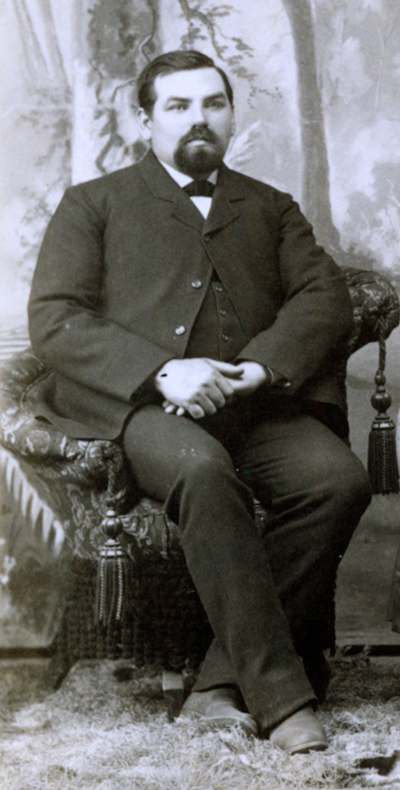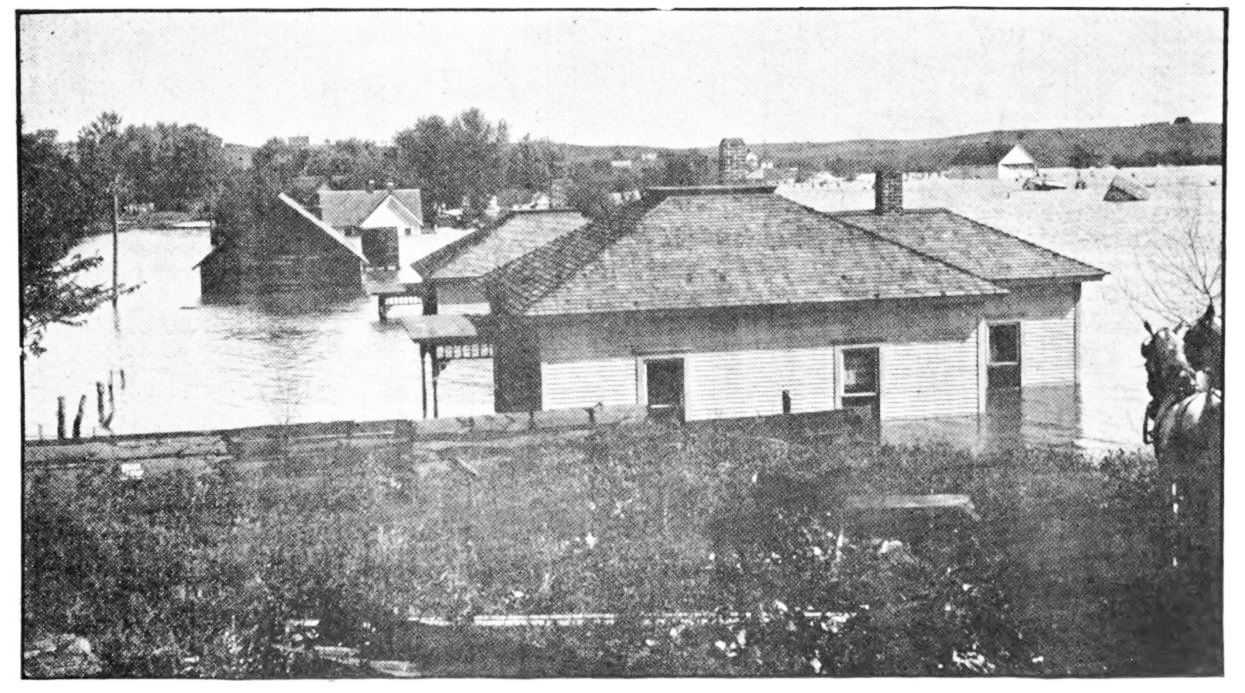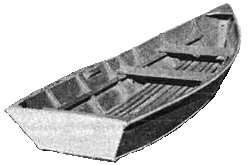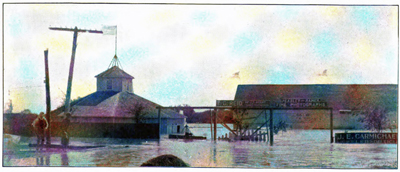
Henry Howitt LaRue was born on July 11, 1852 in Stockbridge,Michigan to Franklin B. and Amelia Wells (Chapin) LaRue. His parents were each born in the Finger Lakes region of New York in the early 1800's but had come to Michigan with their families by the 1830's. He was the second of eight children, although only 4 survived to adulthood. The eighth child, Daisy LaRue, was born in Illinois in 1865 as the family was heading westward. The family had moved to Adams County, Iowa by 1880.
Henry married Louisa Emmeline "Emma" Jennings on January 11, 1883. She was born in June of 1852 to Joseph and Polly (Arnold) Jennings. The family lived in Collins, New York, about 30 miles south of Buffalo, where the first 5 of 8 children were born. Her obituary says she was the last of 11 but her father's obituary says there were 8 children, 7 of whom lived to adulthood. Like Henry's parents the family migrated to McLean County, Illinois where Henry and Emma married. Emma's family remained in McLean County, Illinois.
Henry and Emma had 3 children: Ida May, Albertus Franklin "Bert", and Roy Joseph. Roy died in 1894 at the age of 14 months.
Emma died Februay 10, 1936 at the age of 85. The news article reporting her death said she was found dead in her bed after neighbors had become concerned that her house remained locked. The sheriff was summoned, he forced the door and discovered her lying in her bed. The coroner determined her death was "very quiet and natural - an easy sleeping away."
Emma's obituary refers to two boys raised in the home, Charles and Gussie Pullen. Her will includes a cash settlement to Charles Pullen. Her will also bequeathed 4 homes. A thank you notice after her death was signed by The LaRue Children and Charles Pullen.
More on the search for the Pullen boys here.

The County Fair
Adam's County Annual Agricultural Fair is Held This Week
August 26, 1903: "Monday was the opening day of the annual exhibit of the Adams County Agricultural Fair association and the officers were kept busy attending to those who had entries to make in the various classes. In general it may be said that the exhibits are more numerous than usual, although it is true that the display of grains, vegetables; etc., is below the standard. The total number of entries is very large." The paper further noted the poultry pens were "unusually well filled," among the exhibitors are Edith Kennon and Fred Kennon
There was some concern about the weather, "the success of the Fair is altogether a question of the weather. There was a good rain on Monday night, which laid the dust and made conditions most satisfactory if only the clouds should clear away. There is ground for hope that the weather will clear and if so the conditions will be the best possible. There will be no dust, a great cause of annoyance generally, the track will be in fine conditions and nothing can prevent the Fair from being a great success. Here's hoping for good weather today and tomorrow."
Tuesday, the weather was good but that night it began raining and on Wednesday the Fair was called off or the day. On Thursday the fair was called off until October 5 to 8. The rainfall on Wednesday and Thursday was nearly 10 inches, while from 7 p.m. on Wednesday until Thursday morning the precipitation was 6.75 inches.
Disasterous Flood
The Worst in the History of the County Visits Us
H. H. LaRue Killed While Rescuing Others
Began Raining that Amounted to Almost a Cloud Burst About 3 p.m. Wednesday and is Still Raining at 4 a.m.
Train Washed Off Track Near The Depot
It is Feared that Many Have Lost their Lives and Millions of Dollars Worth of Property Destroyed. Flood extends for Miles.
Without exception the heaviest rain and the most disastrous flood ever known in this locality came Wednesday night. Tuesday night's rain was followed by Wednesday night's deluge and for hours the water fell in torrents. The downpour began between 4 and 5 o'clock Wednesday afternoot and continued without intermissions until after midnight. For perhaps four hours the rain was as heavy apparently as it could possibly be and all agree that never in their lives had they seen it rain so hard for so long a time. Even when there came a lull it was followed by a crash of thunder and another deluge."
Death of H. H. LaRue
Early in the evening, H. H. LaRue, who owned an old flat bottom boat, began the work of getting his stock on the bottom out of danger. He was assisted in the work from time to time by T. O. Bell, superintendent of water works, who had gone to the pump station and remained there trying to fill the big tank until the advance of the water made further effort useless. He was then taken off in the boat by Mr. LaRue and the two got all the stock in and started for home. Evidently Mr. LaRue concluded afterwards that he could do some good at the Fair grounds, as he was shortly afterward assisting the unfortunates there. Some of these had taken refuge in the grand stand and were really in a dangerous plight, as the water was ten feet deep in front of them and no one could tell whether or not the structure would withstand the force of the flood. It was after 1 o'clock when the work was finished and Mr. LaRue decided to start for home. He called out for someone to help him and Millard Jackson, a young man living east of town, volunteered. Young Jackson says the trip was made without incident until they reached the vicinity of the pump station, Jackson was rowing and LaRue was holding a lantern and directing the course of the boat. The latter then said, "I know where we are now. Look out for the electric wire," referring to the lines running to the pump station. The water was high enough to take them close to it. He had scarcely uttered the words when the boat carried them against the wire. LaRue threw up his hand and the wire touched his hand, burning the flesh to the bone. Death must have been instantaneous. He fell overboard and Jackson made an unsuccessful effort to catch him. Jackson kept shouting to cut the wires and word was finally sent to the electric plant and the lights shut off. The young man then made his way to shore. By daylight the work of recovering the body was begun and it was after 11 o'clock when Wilt Devore, one of a party on a raft constructed for the purpose, found it. The body was about 20 feet from where the unfortunate met his untimely death. He was lying on his face, his right hand and shoulder badly burned by the live wire and his left thumb was badly burned. He was taken to Boham's undertaking establishment. The funeral will be held Sunday morning at 10 o'clock from the M. E. church.

View looking towards the Fair Grounds. One of the floating buildings, to the right in the distance is the Judges' stand. This photo was taken after the water had fallen about a foot. It is near this place that Henry LaRue lost his life.
Click on the boat to be taken to a copy of the 1903 publication, "Souvenier of the Corning Flood containing more pictures and stories.

What follows are excerpts from the Adams County Press detailing other catastrophes from the flood. These are from the Saturday, August 29 Edition (the paper was published on Saturday's and Wednesday's only) and appear on page 4. They are listed in the order they were printed and it seems when new information was received the old was not revised. For instance the trainman Phillps and the boys that spent the night in a tree are mentioned in various paragraphs; first was a man and two boys in a tree, second mention was a trainman in a tree and third a lengthy paragraph decribing the whole ordeal. Each of the paragraphs is about the same three.
- It was reported on good authority that Mrs. Will Sanburn and two children, one aged 3 weeks and one 5 years living at Nodaway, were drowned. They were bing taken from their house in a raft and it upset.
- About 8 o'clock the stands and attractions began to move out and the horsemen and stockowners began to move their stuff, as did nearly all others who had exhibits. Some small stock and poultry was not taken out and they are probably many miles below here at this hour.
- Many of the attractions lost all they had. The water came in waves, rose very fast and they were unable to get out only with their lives. Many on the grounds went to the grand stand but in a short time they were in danger. The water at that point was fully ten feet deep and between there and the gate much deeper. It was while rescuing these unfortunates that Mr. LaRue lost his life.
- The water at 3 a.m. was running over the depot platform 6 inches deep. No. 92 had arrived and was on the north track just west of the depot. The track washed out and the entire train had gone on the side except the engine which stood in front of the depot.
- A man and two boys floated from the train to some trees near the residence of John Alexander where they were at last accounts probably safe and will be rescued at daylight.
- No. 92 had several cars of stock and they will probably all perish. The train men are thought to be safe. One of the men in the tree is a brakeman.
- W. J. Egleston living west of town was in the second story where the family were when last heard from and the water still rising. They have a phone and cannot be reached. Unless they reached aid it is thought they have floated away.
- R. F. Tubbs has not been seen since 1 a.m. He went to rescue the deaf mute, Darnell, south of the track. If not in a tree it is feared he has drowned.
- There was a man reported by the railroad men on a telegraph pole near the brick yard bridge, but when help returned he was gone.
- Geo. White was on way home and had just gotten out of his buggy to examine a bridge when lightning struck near by and killed one of his horses. Mr. White and the other horse were badly stunned.
- In the car of race horses was Bert Shigley, Ernest Dickson, J. F. Sash, Ben Harvey. The two boys Dickson and Harvey had observed the approaching water and started for the engine, but were compelled to turn back and soon the car they were on went over, when they fell into the hands of J. E. Phillips, a brakeman, who proved to be their savior. They were near the railroad bridge at the brick yard and soon found themselves in deep water and tangled in the barb wire with telephone poles and cars floating against them. All could swim and after going from one tree to another they finally landed in a burr oak tree after being in the water for over an hour. This was about 2 o'clock. It was a serious question whether they would be rescued and they were very nervous, especially the boys. Young Harvey left a message for his mother should he never get out. When daylight came Mr. Phillips had trouble keeping the boys in the trees - - they wanted to chance the current. When, finally, they saw they were going to be rescued they embraced their guardian for the night like a mother does her child.They were rescued by a boat being sent out to them. Kirk Paul was also rescued from a tree on the south side. The men in the caboose also the occupants of the horse car escaped, although it was thought until late afternoon they were lost. The race horses were both drowned.
- About 4 this afternoon a boat was sent to the home of the deaf mute, Darnell, living south of the depot and he was rescued. It was thought R. F. Tubbs might be found there, but no traces. It is feared he drowned as he was last seen going south from the depot about 10:30 night.
What follows are excerpts from the Adams County Press Wednesday, September 2nd Extra Edition many of the previous days stories are included, some with new facts.
- At about the same time (from the context I believe it was about the same time Henry LaRue was killed.) a number of people were have a thrilling experience at the Burlington station. No. 92, the way freight, had arrived several hours earlier, but was held on account of news of a washout near Prescott. In the way car were J. E. Phillips, rear brakeman, and four men of the crew of an extra which had pulled in behind 92. John Sash, a Creston horseman and two passengers were also in the car and two Creston boys Ben Dixon and Ernest Harvey (these are the boys that spent the night in a tree they were earlier identified as Ernest Dixon and Ben Harvey)were on top of it. Hal Chrisman and Bet Shingley were on top of a second car. Shortly after 1 o'clock the track gave way .... and the way car and a number of freights were thrown into the water.
The next paragraph tells the story of the brakeman Phillips and the boys spending the night in the tree, with a few more details. The boys grew sleepy and Phillips had to keep hitting them to keep them awake. His hands were bady cut on the barbwire fence, his shoulder was bruised and sore, he had to encourage and assist the boys, he had to keep at them to prevent them from going to sleep and falling off and to restrain them from trying to swim to shore, which meant almost certain death to them.
- More mention is made of R. F. Tubbs who who was thought to have been drowned in his attempt to rescue the deaf mute, Darnell. By the time of this printing his body had not been found. Note: The Saturday, September 5th paper contains an obituary and mention his funeral had been the previous Sunday (this can't be correct), he was 63 years old.
- The death of Mrs. Sanborn and her two children was elaborated upon. The family, from Nodaway, were rescued from their rooftop and the raft they were in ran in to the top of a tree and capsized. The men and boys were able to get back into the raft but Mrs. Sanborn and her children were not. There bodies had not been found before the paper going to press.
- Mr. M. F. Norcutt and his eight year old daughter had a narrow escap. They were overtaken by the rush of waters and found safety in a tree. In order to make sure the little girl should not become numbed and fall into the current, Mr. Norcutt tied her to the tree with his suspenders. They were rescued Thursday.

- At the Fair grounds this morning the scene was one of desolation. Many of the showman lost everything they had and almost all their stuff was submerged. The water had stood eight feet deep in the Art Hall and the fancy work and other valuable exhibits in this department were almost ruined. Some of the items in the Floral Hall were stolen, the caption on the photo to the right is "The man in the boat is the suspected quilt thief, who was arrested the following day on charge of taking various articles from the Floral Hall." Click on picture for larger size.
- While the exhibitors of live stock had saved their animals the poultry men were not so fortunate. All the pens were filled and of the hundreds of chickens, ducks, turkeys, geese, etc. only a few ducks and very few chickens survived.
- The family of Charlie Dewees excaped early in the evening. Their house was floated off its foundation, lodging near that of Wm. Darnell.
- Someone's hog house was lodged against a freight car near the railroadwater tank. Friday morning two sleek shoats were found alive and apparently enjoying the situation.
- Miss Ida Chubb had a splendid exhibition of burnt wood in the Art Hall. The whole collection, valued at $85. was ruined.
And This
- The snakes owned by the side show at the Fair grounds are said to have escaped. It is not known whether they were drowned or are now at large. There were some good sized ones among them.
And finally
- The coroner's inquest held over the body of H. H. LaRue returned a verdict in accordance with the account given above. It is impossible at this time to give more than a brief mention of Mr. LaRue as a citizen, but it may be stated that Corning has lost one of her most useful and helpful men. The helpfulness and usefulness which were characteristic of him were exemplified by his work on the night of his death. Always ready to help others, always ready to do his full share of the work and more. H. H. LaRue was a valuable and valued member of this community and his death under ordinary conditions would be greatly regretted. Under the tragic conditions surrounding it the whole community mourns.
Back to top




